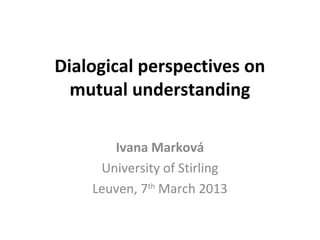
Ivana markova pp + dialogue pp
- 1. Dialogical perspectives on mutual understanding Ivana Marková University of Stirling Leuven, 7th March 2013
- 2. Revolution? • Two meanings: • A) In psychotherapeutic practices, psychiatry, counselling • B) In dialogicality, by paying attention to concepts • Example: evolution and upward progress • dialogical brain: ‘we can speculate how a dialogical self might actually be housed in a dialogical brain’ (Lewis, 2002, p.178) • dialogue and dialogicality deny evolution as an upward progress • Dialectics and dialogicality • Bakhtin: dialogical tension permits realization of author’s intentions in heterogeneity of languages and ideas
- 3. Diversity of dialogical approaches • different theoretical traditions and diverse issues • the ancient philosophy of Platonic dialogues; phenomenology, hermeneutics (Gadamer – interpretation; Levinas – ethical dialogue); interaction (e.g. George Herbert Mead); Habermas’s (1991) communicative action; Mikhail Bakhtin • dialogical approaches do not form a unified theory • From broadly based ‘Rethinking Language, Mind, and the World Dialogically’ (Linell, 2009), to more specific theories of the dialogical self (Hermans and Kempen,1993) and to analyses of detailed aspects of utterances in the contemporary French dialogical linguistics (Salazar-Orvig and Grossen, 2004).
- 4. Meanings of dialogue • Dialogue as a symbolic interaction between two or several individuals who are mutually co-present; extensions to artefact-borne forms (e.g. written messages, pictures, internet) • Internal dialogue - dialogues of individuals and groups and with absent individuals • Dialogue among ideas rather than between people e.g. in ‘The Rules of Sociological Method’ (Durkheim, 1938, p. li); to investigate the ways in which social representations ‘adhere to and repel one another, how they fuse or separate from one another’ – in other ways, how they circulate in society. • Dialogue between different cultural traditions and historical epochs (Bakhtin (1979/1986a, Yuri Lotman, 1990); e.g. Mediaeval culture and Renaissance.
- 5. Intersubjectivity and strife for recognition • Intersubjectivity • the self-other as an irreducible dyad in theories of the self by James Mark Baldwin, George Herbert Mead and Lev Vygotsky; • Trevarthen: intersubjectivity can provide an explanation “of how human social and cultural knowledge is created, how language serves a culture and how its transmission from generation to generation is secured” • Matusov – intersubjectivity may lead to disagreement • Bakhtin - dialogue as a strife of divergent perspectives
- 6. Intersubjectivity and strife for recognition • The strife for social recognition • Studies in difficult communication, e.g. cerebral palsy or learning difficulty; consistency and innovation in imposing own meaning on the other • No kind of resources can be a priori considered as non- communicative or as discrete and isolated units • Strangeness - effort of the self to understand and surmount the unknown qualities and meanings of others • Tension is ever present, whether participants strive for intersubjectivity, for dominance, for overcoming strangeness of one another, or for dialogical mutualities
- 7. Uniqueness of a dialogical encounter • Uniqueness - interdependence of participant(s) with the situation/context • No inductive cumulating of data from questionnaires or scales • Flyvbjerg, B. (2006) Five Misunderstandings About Case-Study Research - unique cases must be strategically selected Qualitative Inquiry, 12, pp. 219- 245; ‘analytic generalization’ • when the aim of research is to bring out the greatest possible knowledge about a given phenomenon, a random or a representative sample, aggregation, and averaging of gathered facts do not provide rich knowledge about the phenomenon in question
- 8. Trust and dialogue • If dialogicality is the fundamental capacity of the Self to conceive, create, and communicate about social realities in terms of the Alter – participants must have a basic trust that there is a common ground between them • The term ‘trust’ has special dialogical qualities because it is the existential feature of both intersubjectivity and of social recognition • It expresses the Self’s direct relation to the other and to the shared social world; unreflected and reflected trust; other terms like ‘love’, ‘attachment’ • Ontological moral and ethical binding to fulfil mutual expectations and obligations
- 9. Trust and dialogue • Trust - deep religious, philosophical, ethical, linguistic roots • in daily life it makes sense only with respect to its opposite, (e.g. distrust, doubt, risk) • ethical obligations, linguistic and non-linguistic features of communication, the nature of interaction, to content of what is communicated • Simmel (1950) - ethical obligations in secret societies • Dialogical features of concealing and revealing secrets • Micro-social and macro-social forms of trust and distrust • Unreflected and reflected forms of trust
- 10. Forms of trust and distrust • Trust as a polysemic concept • From pre-conceptual to conceptual and reflected trust • From micro-social trust (e.g. Erikson) to macro-social trust (e.g. Simmel) • Erikson: ‘basic trust’ as the first mark of mental life, preceding any feelings of autonomy and initiative. It evolves through mutual somatic experiences and ‘unmistakable communication’ • Simmel: the society would disintegrate without trust, feeling that binds society together
- 11. Macro-social trust A priori generalised Context-dependent trust (G. Simmel) (context-specific) trust Psychosocial feeling P re audits -co st nce tru pt u u al al t pt Machiavelian rus n ce Social cohesion t Co strategies In-group solidarity Co-operation Local communities Primary (taken-for- Reflective trust granted) trust Co n ce p tu a st l tr ust l tru ua pt Third parties n ce e -co Pr Emotional interdependence Self doubt/confidence Psychosocial feeling basic trust Inner dialogicality (ontological) Micro-social trust
- 12. Confession • Bakhtin’s (1984) analysis of dialogical trust and risk in confessional discourse • Confession - a self-reflective dialogical interaction between the self and other; communication genres of Dostoyevsky’s heroes and anti-heroes; confessors’ strategies in exposing themselves to distrust of the other; fear of non-recognition and rejection; confession and rejection of those who agree with self-condemnation; dependence and orientation of the self towards the other; • Implication of Bakhtin’s analysis for psychotherapy
- 13. Dialogical perspectives on mutual understanding A dialogue between Ivana Marková and Peter Rober